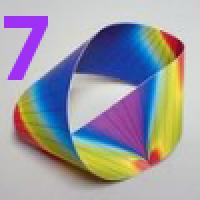
Plus Advent Calendar Door #7: Seven is lucky!

We've all got favourite numbers and some of us even go as far as thinking some numbers lucky or unlucky. Seven is probably one that crops up quite a lot in this context, so it's nice to know that it really is a lucky number. No, seriously, that's true! There is a mathematical recipe for finding lucky numbers, and 7 is one of them.
The recipe goes like this. Write down all the positive whole numbers starting from 1. First, you eliminate all even numbers, leaving only the odds:
The next number on the list after 1 is 3, so you now go and eliminate every third number, leaving:
The next surviving number after 3 is 7, so you eliminate every 7th number in the list of survivors. And so on. When you've finished this process the sequence of surviving numbers starts:
These surviving numbers are called lucky numbers. They are similar to the prime numbers in some ways. There are infinitely many of them, and they are the result of a sieving process (successively eliminating numbers) similar to the sieve of Eratosthenes which sieves out primes. When you try and approximate the distribution of the lucky numbers among the other numbers as you move up the number line, the result is akin to the prime number theorem. The lucky numbers even have their own version of the Goldbach conjecture, which states that any odd number greater than 4 can be written as the sum of two primes. One thing that isn't known, though, if whether there are infinitely lucky numbers that are also prime, or only finitely many.
All this doesn't make 7 lucky in the everyday sense of the word — but it makes us feel very lucky to have so many numbers to play with!